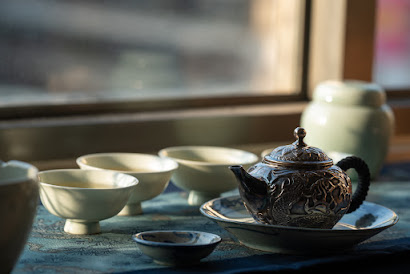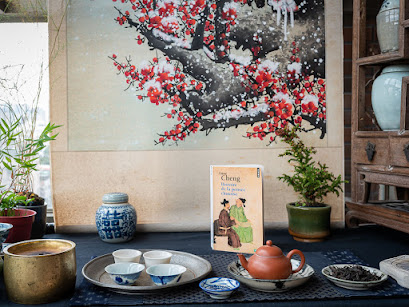A Taiwan, la fête des pères tombe le 8 août (car 8/8 est prononcé 'baba' en chinois) et j'en profite pour souhaiter une bonne fête à mon papa! Si je le fais publiquement, sur mon blog, c'est parce que les circonstances de 2020 sont assez particulières. J'avais écrit
cet article en mars pour lui rendre hommage, ainsi qu'à ma mère, car ils étaient en première ligne face au Covid. Je tenais donc à vous informer de la fin de cette histoire.
Mais avant de parler de la fin, parlons un peu du tout début! Pour moi, avant d'être 'fils de médecin', je suis surtout le fils de mon père, et il a eu une grande influence sur moi, naturellement. Vous le présenter, c'est aussi un peu vous parler de moi, vu que je semble avoir autant hérité ses gênes que son caractère. Donc, allons-y! Mon père vient d'un tout petit village du nord de l'Alsace, Lembach, à 2 pas de la ligne Maginot. Second fils d'une famille de 5 enfants, il a passé une grande partie de sa scolarité en internat, chez les curés. Ce n'était pas très fun et cela l'a assez dégoûté de la religion. Mais il y a toujours un bon côté même aux mauvaises situations: il y a acquis de bonnes connaissances de grec et de latin, et cela l'a (sûrement) aidé à réussir médecine.
Il faut savoir, qu'à l'époque, médecin généraliste était un métier très prestigieux et que peu se spécialisaient. On considérait alors qu'il était plus difficile de comprendre toutes les interactions dans le corps humain, que juste une partie (les yeux, les dents, les os, la peau...). Depuis, les connaissances et la recherche médicales ont fait de tels progrès qu'il est nécessaire de se spécialiser, mais à l'époque ce n'était pas encore vraiment le cas.
Après son internat à l'hôpital de Haguenau, mon père s'est installé comme médecin généraliste dans le village de Schweighouse sur Moder (4500 habitants), juste à côté de Haguenau et pas très loin de Lembach. Venant d'un tout petit village, je crois qu'il ne se voyait pas trop vivre dans une grande ville. On avait habité en appartement à Haguenau pendant son internat, mais il se sent mieux dans une maison avec jardin! Mais, du coup, professionnellement, il y avait moins de perspectives dans un village que dans une grande ville. Les débuts furent difficiles et il n'eut pas une carrière facile.
En médecine, il faut surtout savoir rassurer et promettre que tout ira mieux. Or, ce rôle n'est pas aisé à jouer quand on est un jeune diplômé, surtout quand on vient du fin fond de la campagne alsacienne. Pourtant, il avait pu faire un bon 'buzz', car, encore interne, il avait réanimé un patient de Schweighouse pour lequel ses collègues avaient abandonné tout espoir! Dans cet épisode, mon père fut tel Neo dans Matrix: il fit un long massage cardiaque et le coeur du gars se remit à battre! Mais pour les maladies plus bénines, de tous les jours, celles pour lesquelles les médicaments vous guérissent en 7 jours, là où la nature et le temps mettent 1 semaine, il n'arrivait pas à faire venir les patients en grand nombre.
Ce manque de confiance en soi, il l'a compensé en continuant d'apprendre et de se former. Il avait besoin d'être convaincu afin de pouvoir convaincre. C'est pourquoi, il a continué à suivre de très nombreuses formations pour s'améliorer et avoir l'assurance de dire "N'ayez crainte, je vais vous soigner et vous allez guérir." En plus de 40 ans de métier, il a appris et essayé un très grand nombres de techniques (dont l'acupuncture, les rayons chauffants, des micro-piqures...) pour finalement développer sa propre technique, celle qui lui donna le plus grand pourcentage de réussite (le 100% n'existe pas en médecine...).

Il a su concilier la médecine 'officielle', celle des médicaments pour les maladies sévères, avec une médecine plus douce pour des problèmes plus strictement somatiques. Selon les statistiques de la Sécu, il prescrivait bien moins que la moyenne des médecins locaux. En fait, pendant très longtemps, beaucoup de ses patients étaient frustrés par ses courtes ordonnances. Un autre médecin leur aurait prescrit bien plus de médicaments ('c'est la Sécu/mutuelle qui paie!') et cela rassure le patient d'avoir beaucoup de comprimés/sirops pour combattre sa maladie!... Mais mon père a toujours essayé de privilégier le naturel et, pour lui, la meilleure médecine, c'est de commencer par manger des produits sains, préparés chez soi! Son ennemi, c'est le sucre, et il n'en met jamais dans son thé, surtout depuis qu'il s'approvisionne chez moi!
Médecin généraliste à la campagne, c'est surtout soigner les bobos du quotidien des gens des environs. Mais ce qui lui donnait le plus de satisfaction, c'était de pouvoir guérir des patients qui venaient de très loin et qui avaient déjà essayé les remèdes d'un grand nombre de confrères! Il avait, par exemple, des patients qui venaient de Haguenau, Strasbourg ou bien même une patiente qui travaillait à Paris! Pour eux, mon père faisait pratiquement des miracles! Je vous entends: vous pensez que j'exagère parce que c'est mon père. En fait, j'ai été témoin d'un tel miracle chez sa patiente la plus lointaine: ma femme!
Il y a quelques années, ma femme fut affectée par des douleurs intermittentes lorsqu'elle se tenait debout ou marchait. Parfois, elle ne pouvait pas sortir de la maison, tellement elle avait mal. Elle alla consulter plusieurs médecins à Taipei, même des spécialistes reconnus dans des grands hôpitaux et fit une batterie d'examens. Ils lui prescrirent surtout des médicaments contre la douleur, mais, d'après eux, ce n'était pas une maladie curable, mais plutôt un signe de vieillissement un peu précoce. Bref, elle avait pratiquement abandonné tout espoir de guérison. Quelques semaines plus tard, mes parents vinrent nous rendre visite à Taiwan et je demandai à mon père de voir ce qu'il pouvait faire pour ma femme. Après 2 séances de sa technique, sans aucun médicament, elle était de nouveau totalement requinquée et n'a plus eu de problèmes pour marcher depuis!
Il a donc souvent eu cette satisfaction de faire mieux que les spécialistes et les médecins les plus célèbres et les plus influents de Paris et de Taipei (c'est à dire de France et de Taiwan)! Mais jusqu'au bout il n'a pas cherché une gloire publique. Il n'a pas écrit de livre, ni créé de formation pour une méthode qui aurait portée son nom, et il n'est jamais passé à la télé! Il s'est peut-être dit qu'à chaque médaille il y a un revers, et que la vie tranquille d'un médecin de campagne, loin des lumières, était celle qui lui convenait le mieux...
Mais ce printemps, quand le virus déferla sur l'Alsace, j'eus peur pour lui et pour ma mère. C'est pourquoi j'écrivis
mon article en mars pour les soutenir et leur dire tout mon amour. Je me rends mieux compte maintenant, que toute sa vie, mon père a mené des luttes acharnées. D'abord, il a réussi les longues et exigeantes études de médecine, puis, il s'est battu pour trouver une excellente méthode de soin sans produits pharmaceutiques. Cela lui permit de remporter sa plus grande victoire, celle sur lui-même. En trouvant confiance, sérénité et satisfaction dans son métier, il a pu mener une vie belle et respectable à la campagne.
Aujourd'hui. je peux vous rassurer. Mon père a aussi su surmonter le défi du Covid19 et a enfin pris sa retraite fin juin. Agé de 73 ans, je crois qu'il a amplement mérité son repos de médecin guerrier. Et je suis très heureux pour lui et ma mère, de savoir qu'ils ont réalisé leur rêve méditerrannéen. Désormais, chaque jour, ils dégustent du bon thé de Taiwan devant ce magnifique paysage!
De nouveaux défis l'attendent dans sa nouvelle vie, mais une chose est certaine: son exemple continuera de m'inspirer! Bonne fête papa!































